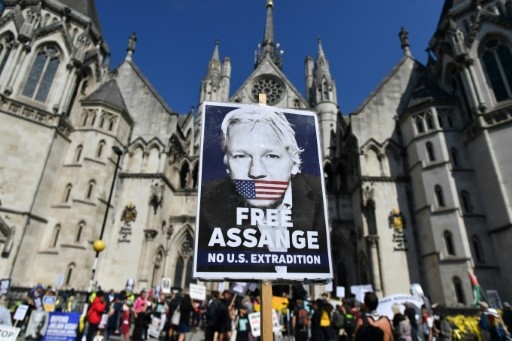U.S. to begin appeal to extradite Assange from UK

The United States government will on Wednesday begin an appeal to extradite WikiLeaks founder Julian Assange to face trial for publishing military secrets, after a British judge blocked a request earlier this year.
Washington said after the decision in January that it was "extremely disappointed" by District Judge Vanessa Baraitser's decision, which was made on the grounds of Assange being a suicide risk.
It is seeking to overturn that ruling at a two-day hearing from Wednesday, having argued during its request for an appeal that the judge "didn't appreciate the weight" of expert evidence that said he was not at risk of taking his own life.
Instead, it claimed the judge was "misled" by relying on evidence presented by Assange's psychiatric expert Michael Kopelman.
Assange, 50, was arrested in Britain in 2019 for jumping bail after spending seven years inside the Ecuadorian embassy in London to evade extradition to Sweden to face allegations of sexual assault, which were later dropped.
Despite his extradition being blocked, Assange has been refused bail pending the outcome of the appeal over fears he would abscond and is being held at London's high-security Belmarsh Prison.
He is wanted in Washington to face 18 charges relating to the 2010 release by WikiLeaks of 500,000 secret files detailing aspects of military campaigns in Afghanistan and Iraq.
If convicted in the United States, he faces a maximum sentence of 175 years in jail.
Judge Baraitser said it was not evident that the U.S., keeping him jailed while awaiting trial, would be able to ensure his safety in prisons known for "harsh conditions".
She rejected U.S. experts' testimony that Assange would be protected from self-harm, noting that others such as disgraced U.S. financier Jeffrey Epstein had managed to kill themselves in custody despite wardens' supervision.
"For this reason I have decided extradition would be oppressive by reason of mental harm and I order his discharge," she said.
Legal expert Carl Tobias, from the University of Richmond, said there was "some chance" of the U.S. winning its appeal.
"The U.S. may be able to convince the High Court that Baraitser assigned too much weight" to the Kopelman report, he told AFP.
"However, even if the High Court agrees with the U.S. contention that she accorded too substantial weight to the expert report, that may not be sufficient to warrant overruling her entire decision," he added.
Assange was indicted for violating the U.S. espionage act in leaking the U.S. files, and for hacking, based on the alleged assistance he provided former military intelligence officer Chelsea Manning in obtaining the documents from secure military computer systems.
But the U.S. case raised free speech issues, with Assange and his defenders maintaining that WikiLeaks enjoys the rights of any other media to publish secret materials in the public interest.
Rebecca Vincent, of media advocacy group Reporters Without Borders (RSF), said he had been "targeted for his contributions to public interest reporting" and urged President Joe Biden to drop the case.
Assange's French lawyer Antoine Vey told AFP that his client "was a man who is very scarred, both psychologically and physically," adding that his condition had worsened.
"As Mr Assange's health has not improved, there are no new elements that would lead the appeal judges to reverse the decision to refuse extradition," he said. "It's a matter of life and death."
Assange, an Australian national, has a vocal campaign of supporters, led by his fiancee Stella Moris, a former member of his legal team who is the mother of his two young boys.
The publisher sought, but failed, to obtain a pardon from Biden's Republican predecessor Donald Trump, whose 2016 election campaign benefited from WikiLeaks' release of materials that damaged his Democratic opponent, Hillary Clinton.
Judges at the High Court of England and Wales will issue a decision once the evidence from the hearing has been considered.
If the U.S. appeal is successful, the case will be sent back to the lower court for a new decision to be taken.
Whoever loses in the High Court can ask for permission for a further, final appeal to the Supreme Court.
Source: japantoday.com
